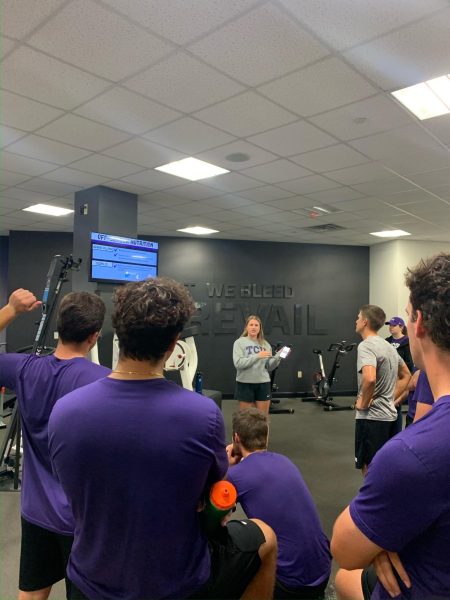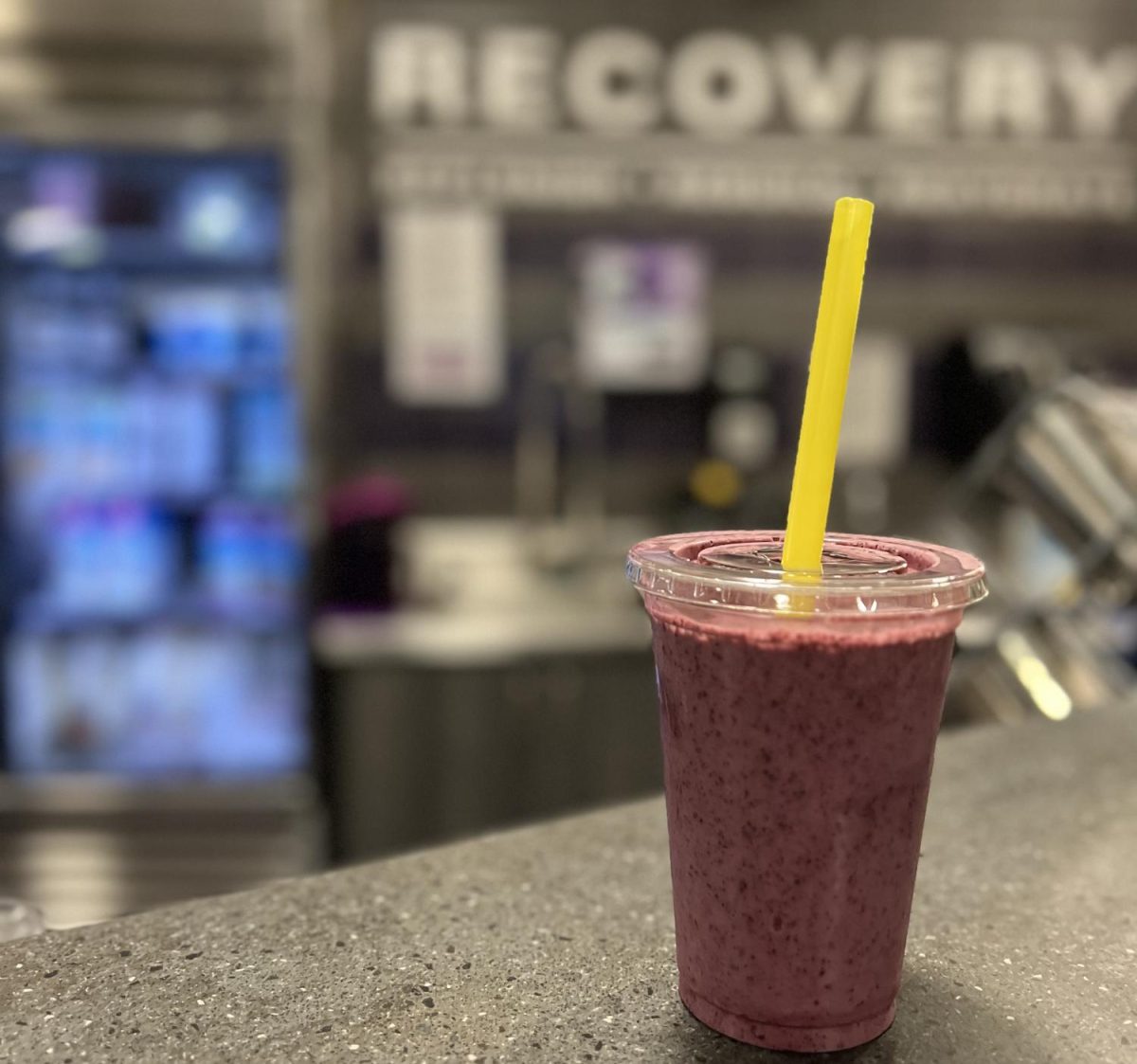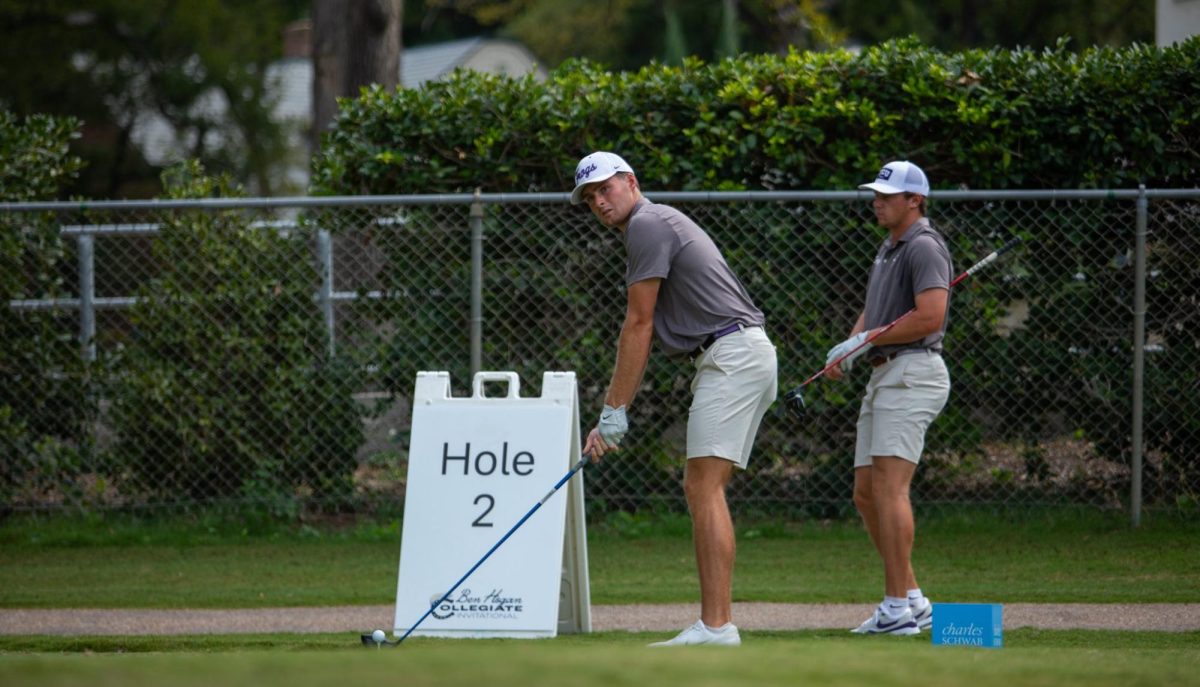Carbs before a round of golf are vital to making it through all 18 holes. Mix in some protein and fat before the sixth for some extra energy. Oh, and stay hydrated, too.
That’s how TCU dietitian Claire Cimino sees it.
Since June 2022, Cimino has worked as a graduate assistant dietitian with athletes in five different sports, including men’s and women’s golf, soccer, basketball and equestrian. After graduating from TCU in 2021, Cimino worked as a dietitian at the University of Tennessee before returning to TCU to get her master’s degree.
She said she uses different nutritional strategies for each sport depending on its intensity and duration. For example, golfers might be on the course for nearly an entire day.
“Throughout the whole game, you want to make sure you’re snacking on the course,” she said.
Since golf is a long-duration sport, in-round nutrition includes a mix of macronutrients, carbs, fat and protein for sustained energy. Before tournaments, Cimino meets with players to educate them on what to eat on the course. She writes her recommendations on a card that attaches to their bag. The players can reference it during the round to make sure they don’t “hit a wall” and can optimally perform from the first hole to the last.

Cimino said maintaining mental clarity is also a key factor for golfers.
“Having enough nutrition to make sure you have that sharp mind and good decision-making,” she said. “That’s also a part of golf, which is different.”
After a breakfast high in carbs, fruit and protein, such as eggs, toast and a banana, she recommends cold, easy-to-digest foods like applesauce early in the round. Cooler foods can be easier to stomach while anxious.
After a few holes, she recommends mixing protein and carbs, like beef jerky and pretzels. Finally, later in the round, she recommends incorporating healthy fats through something like trail mix. Cimino emphasized the importance of hydration as another key part of nutrition for any sport.
“You can’t just chug the water bottle and be done,” she said. “You have to sip on it throughout and add electrolytes.”
Off the course, Cimino said sports nutrition helps players recover, meet performance goals and prevent injuries.
Given athletes’ busy schedules, convenience is a key factor for nutritionists to consider. The weight room in Ed and Rae Schollmaier Arena has a fueling station with smoothies, acai bowls and other snacks so athletes can lift, recover and head straight to class.
She said golfers often come to her hoping to put on muscle and put more power behind their swing.
“So based on…how they’re feeling performance-wise, they’ll come to me with ‘Hey, I really think I need to increase my muscle mass,” she said.
Cimino meets with the athletes individually to come up with a plan suited to their health and performance needs. After a consultation, they can track progress using body composition tests to show changes in muscle mass or fat mass over time.
Coach Allcorn said freshman golfer Andrew Petruzzelli is working with Cimino to get bigger and stronger as a hitter.
To put on muscle mass, Cimino recommends increasing carbohydrates from a third of the plate to half the plate and increasing protein content. For Petruzzelli, she focused on educating him on nutrition and the resources at TCU that can help him meet his goals.
“Adding higher caloric foods, having olive oil added to your vegetables, adding peanut butter to your smoothies, hummus, there’s dried fruits,” she said. “Then we have also focused on fueling on the course because if you’re not eating anything, you’re almost fasting on the course. That’s time taken away from achieving that goal.”
Petruzzelli said some days he doesn’t have an appetite, so they have focused on liquid calories, such as shakes and smoothies, so he can gain weight.

Cimino said learning what motivates each athlete can be key to helping them hit their nutritional goals.
“You can educate, you can tell them all the benefits of doing X, Y and Z,” she said. “But really, it’s up to them. Maybe it’s, ‘Hey, if you’re eating well, 10 years from now, you’re still going to be able to play golf.’”
Good nutrition can be key to a golfer’s longevity because of how the sport’s repetitive motions can strain joints, tendons and ligaments.
Cimino said fish oils, which are sources of omega-3 fatty acids, have anti-inflammatory properties useful for sustaining their joints.
“If they had an injury to their tendon or cartilage in their shoulder or something, we provide collagen,” she said, referring to a type of protein that cartilage and ligaments are made of. “You can find it in food sources, but having a supplement really confirms that you’ll get enough.”
Certain foods and nutrients can help, but Cimino said an overall healthy diet is more important than any single food or supplement.
“Providing your body enough sleep, enough water, enough nutrients including fruits and vegetables, that is really going to help minimize the risk of injury,” she said.










